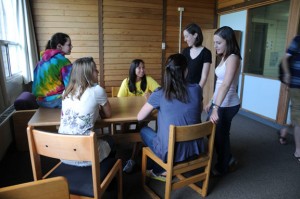
Returning students who settled into on-campus housing last week might have found a significant addition to their residence halls from last year — a lounge.
Extended occupancy housing was reduced from approximately 600 students at the beginning of 2009 to about 380 students this semester, opening up at least one uninhabited lounge per residence hall.
The changes are the result of a smaller incoming class and a procedural re-evaluation, after focus groups conducted last spring showed discontent with the absence of lounges, Bonnie Prunty, director of the Office of Residential Life, said. This year’s freshman undergraduate enrollment was estimated at 1,620 students, compared to last year’s enrollment of 2,027, according to the Office of Institutional Research.
Prunty said the office is not allowing full-year residencies in lounges like it did last year. The approximately 80 residents in 25 lounges will receive a $655 incentive, cable, a microfridge and priority placement on waitlists for double and triple rooms. These students will be offered the spaces when they become available after students go abroad or transfer. They may decline the first offer but will be forced to accept the second.
“What was not successful [last year] was the decision to let students who were living in lounges to remain in lounges if they wanted to all year long, which ended up tying up the vast majority of our lounges for the entire academic year,” Prunty said.
Junior Lillian Carbonara, a resident assistant in Holmes Hall, said the lack of lounges last year presented challenges for organizing activities in the hall and added to roommate conflicts. She said one of her residents found it difficult to be alone when dealing with roommate troubles.
“She didn’t really have a place to go after the library closed or after [IC Square] closed,” she said. “So she would have to go to a friend’s room, but if we had had a lounge she would have been able to hang out in there for a little bit and have time to herself.”
Linda Koenig, assistant director for housing services and communications, said Residential Life could not guarantee conventional housing to students in lounges last year because there were not enough rooms to relocate all extended occupancy residents.
“[Last year] we didn’t want to create an expectation for students that then we weren’t going to be able to fulfill,” she said.
This year, the college plans to move all lounge residents to conventional dorms by winter break, Prunty said.
Sophomore Lauren Smith lived in a lounge last year. She said she felt guilty for taking the space from the rest of the residential hall, but with the School of Music right outside and no other rooms available in the hall for her to practice in, she did not want to leave the lounge.
“I just thought it would be easier on myself not to go through another adjustment to living somewhere else and meeting the people in the new building,” she said.
Prunty said by second semester there were more than 100 vacancies that extended occupancy students declined to move into.
But to curb the lack of common space in some dorms last year, Koenig said Residential Life designated some regular dorms as lounges.
“When we had open doubles and students in lounges didn’t want them, we converted [them] into lounges so the students would have a place to go and relax,” she said.
To keep lounges open this year, the college moved a higher percentage of extended occupancy students into forced triples. The triples are considered permanent housing and residents only received a $655 incentive.
Freshman Jaime Odin, who lives in one of these forced triples, said he was unhappy about living in the room at first, but after moving in, he didn’t mind.
“I knew it would be a tight fit,” he said. “But I was expecting that, [since] my sister had the same thing at her school.”
Prunty said the need for extended occupancy housing this year was not a result of the freshman class size.
“The freshman class was actually right on target,” she said. “It was totally a result of the fact that we had more upperclassmen who elected to stay on campus.”
Residential Life has been offering $2,000 incentives to students who move off campus since May and will continue to do so until Sept. 30.
Koenig said the office learned from last year and has made an effort to accommodate all students on campus.
“It’s not ideal,” she said. “Ideal would be no one in extended occupancy triples and no one in lounges, but [it’s] much better than last year.”







